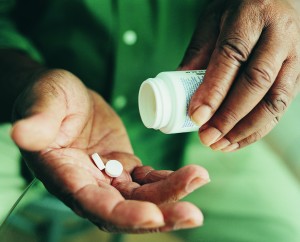To Aleve or Not to Aleve
Recently, my doctor recommended non-specific anti-inflammatory drugs (NSAIDs) to help calm down some chronic nerve pain down my leg. I wanted to oblige wholeheartedly, but I admit I had reservations. Just because they’re over-the-counter, NSAIDS can still have some dangerous side effects if you take them on a long-term basis. Trust me, I know this from personal experience.
In the lead-up to my Boston Marathon in 2008, I felt a little niggle in my thigh, a familiar tightness that I recognized as a growing inflammation in my tendon. Paranoid that all of my training would be for naught because my body wouldn’t allow me to finish the race, I tried to calm it down by taking Advil for four days right before the race, at doses high enough to be not just pain-relieving, but anti-inflammatory too — a total of four pills at 200 mg each, three times a day. (Note that the maximum recommended dose of Advil in a day is 3200 mg or 16 pills). I finished my marathon, but I paid a price with intestinal cramps that lasted the next 24 hours. Turns out, taking NSAIDs in the days leading up to a marathon is not recommended: it inhibits the production of prostaglandins that help to line and protect the intestines. I would have been better off just resting, stretching, and massaging my leg.
Those sorts of problems aren’t such a problem if you take the painkillers with food, avoid doing marathon-type exercise, and don’t do it for more than a couple of weeks. But there are a couple of better options too. Aleve, for one thing, uses an ingredient (Naproxen) that doesn’t have the same impact on your stomach that I experienced — it also doesn’t need as many pills to reach the same effect. (Note, it can be dangerous for people on beta-blockers or with high blood pressure, though).
There are more natural alternatives as well. Foods like fish (salmon is a great choice), nuts (walnuts especially), peanut butter, ginger, or even omega-3 supplements are all natural anti-inflammatories, so for those with philosophical or personal reasons not to use pharmaceuticals, or those with very minor inflammation, these dietary sources of help may be helpful in addressing the problem.
I decided to try Aleve this time, following my doctor’s orders. It worked great, and while I was at it, I also put myself through the tried-and-true remedies that should always make a showing in your standard injury treatment: rest, ice, elevation, modified workouts, massage, and relaxation.



